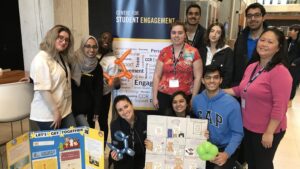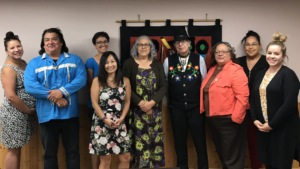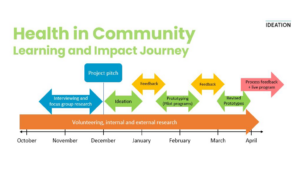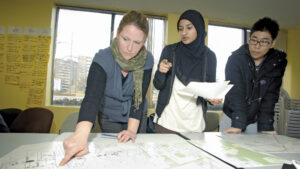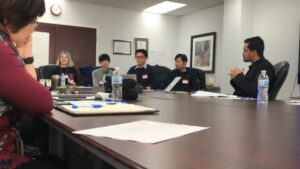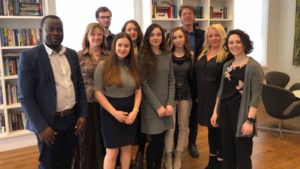WHAT IS IT?
A project-based research, design, consultancy, creative or artistic work experience undertaken in partnership with an organization or individual external to the University or the course. The primary purpose of the experience is typically praxis, knowledge exchange or dissemination, and/or the development of new knowledge, products, technologies or services.
IMPORTANT CONSIDERATIONS
Eligibility:
- Organization-partnered projects typically take place as part of a course. Eligibility requirements for these types of courses vary.
Duration:
- Projects of this nature are part-time and have a flexible duration; they can last from a few hours to many hours over the course of an academic term.
Recognition and / or compensation:
- Students will typically receive course credit for participating in an organization-partnered project.
Accessibility:
- Inclusion in EL is achieved when an experience supports learning for all students. In keeping with the Ontario Human Rights Code, the University of Toronto has a commitment to an equitable learning environment for people with disabilities. It is important to engage in an interactive process to determine the optimal and most appropriate accommodations for individual students engaged in experiential learning.
- If a student requires an accommodation related to an organization-partnered project, you may wish to connect with one of the accessibility services offices at the University of Toronto. Staff at these offices will advise you on the disclosure of accommodation requirements as well as support you through the process of determining and negotiating effective accommodations for the student’s individual circumstances.
- Student support offices strive to create a safe and comfortable community where students have opportunities to discuss navigating barriers, find peer support and learn about various academic and social opportunities.
ADDITIONAL INFORMATION
- Review the Guidelines & Procedures page to further understand which partnership agreements, insurance and liability coverage and health and safety policies are applicable to organization-partnered projects. The Experiential Learning Risk Management Matrix provides a one-page overview.
- An unpaid student placement agreement is not required unless a third party requires an agreement to document the scope of the project, use of confidential information and sharing of outcomes with the third party. If an agreement is requested, it must be vetted and approved by the head of the academic division and the University’s legal counsel. Agreements of this nature would be signed by the head of the academic unit and the third party. Students and course instructors do not sign these agreements.
- Workplace insurance coverage depends on the circumstances of the experience. Check with your divisional office or email the student placements office: placements@utoronto.ca.
General liability insurance coverage depends on the circumstances of the experience, instructors or program coordinators should contact the Risk Management and Insurance Department.
BENEFITS
- Students consider an organization’s challenge / project through the lens of their area of study, thereby allowing them to understand the applications of their degree to potential future career pathways.
- Organization-partnered projects allow students’ insight into various types of organizations and industries.
- These projects provide students with opportunities to enhance their professional skills as they engage with professionals in a structured manner.


